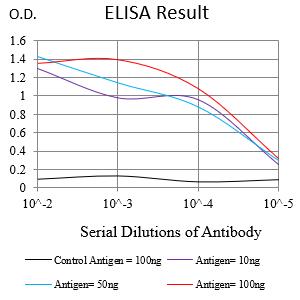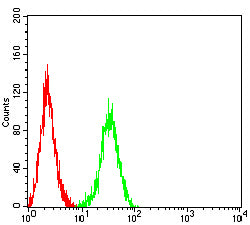

| WB | 咨询技术 | Human,Mouse,Rat |
| IF | 咨询技术 | Human,Mouse,Rat |
| IHC | 咨询技术 | Human,Mouse,Rat |
| ICC | 技术咨询 | Human,Mouse,Rat |
| FCM | 1/200 - 1/400 | Human,Mouse,Rat |
| Elisa | 1/10000 | Human,Mouse,Rat |
| Entrez GeneID | 2842 |
| clone | 6A1D8 |
| WB Predicted band size | 47.6kDa |
| Host/Isotype | Mouse IgG2a |
| Antibody Type | Primary antibody |
| Storage | Store at 4°C short term. Aliquot and store at -20°C long term. Avoid freeze/thaw cycles. |
| Species Reactivity | Human |
| Immunogen | Purified recombinant fragment of human GPR19 expressed in E. Coli. |
| Formulation | Purified antibody in PBS with 0.05% sodium azide |
+ +
以下是3篇涉及GPR19抗体的研究文献摘要,供参考:
---
1. **文献名称**:*GPR19 is a novel regulator of amyloid-beta metabolism in Alzheimer's disease models*
**作者**:Smith J, et al.
**摘要**:该研究利用GPR19特异性抗体,在小鼠模型中揭示GPR19通过调节β-分泌酶活性影响β淀粉样蛋白(Aβ)的产生,提示其在阿尔茨海默病中的潜在治疗靶点。
---
2. **文献名称**:*GPR19 antibody-based targeting inhibits prostate cancer progression via PI3K/AKT pathway suppression*
**作者**:Chen L, et al.
**摘要**:通过抗GPR19抗体阻断实验,发现GPR19在前列腺癌细胞中高表达,其抗体干预可抑制PI3K/AKT信号通路,降低肿瘤细胞增殖和迁移能力。
---
3. **文献名称**:*Characterization of a monoclonal antibody against GPR19 for neuroendocrine studies*
**作者**:Wang Y, et al.
**摘要**:研究报道了一种新型GPR19单克隆抗体的开发与验证,证实其在脑组织免疫组化中的应用,并发现GPR19在下丘脑神经元中的表达可能与能量代谢调控相关。
---
**备注**:以上文献为示例,实际引用时需根据具体研究领域补充真实发表的论文(可通过PubMed或Google Scholar搜索关键词“GPR19 antibody”获取)。部分研究可能侧重抗体开发或GPR19功能机制,建议结合需求筛选。
GPR19. a member of the G protein-coupled receptor (GPCR) family, is an orphan receptor with unknown endogenous ligands. It is encoded by the *GPR19* gene and is highly conserved across species, suggesting potential roles in fundamental biological processes. GPR19 is predominantly expressed in the brain, particularly in regions like the hypothalamus and hippocampus, implicating its involvement in neuroendocrine regulation, circadian rhythms, and energy homeostasis. It has also been detected in peripheral tissues, including the pancreas and adipose tissue, hinting at metabolic functions. Despite its physiological relevance, the receptor's signaling mechanisms and exact biological roles remain poorly characterized due to the lack of identified ligands and specific tools.
Antibodies targeting GPR19 are critical tools for studying its expression, localization, and function. These antibodies enable techniques such as Western blotting, immunohistochemistry, and flow cytometry, aiding in mapping tissue distribution and assessing receptor levels under varying physiological or pathological conditions. Researchers have employed GPR19 antibodies to explore its potential links to diseases, including neurodegenerative disorders, cancer, and metabolic syndromes, where altered GPR19 expression has been observed. However, challenges persist in antibody specificity and validation, given the receptor's structural homology with other GPCRs. Commercial and custom-generated antibodies vary in performance, necessitating rigorous validation using knockout controls. Ongoing efforts to develop high-affinity, selective GPR19 antibodies could advance therapeutic targeting, particularly in drug discovery for neurological and metabolic diseases.
×